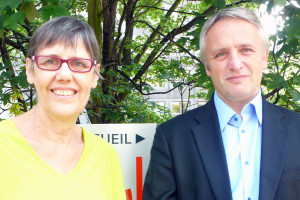Françoise Depoid and Benoît Forêt
tell us about INED’s General Secretariat

Françoise Depoid became General Secretary (SG) of INED in October 2009 after serving for twenty months as deputy Secretary. She is now retired, and in May 2012 Benoît Forêt took over the position.
(Interview from May 2012)
Françoise, how has the role of General Secretary evolved in recent years?
All public administrations have undergone major changes. In the area of human resources, changes have occurred in civil service regulations (mobility, occupational training, etc.) and practices (professionalization of hiring, evaluation procedures, etc.). Regarding budget funding, the period was marked by the implementation of new rules for justifying expenses and monitoring their efficiency, while at the legal level there have been changes to the code of public procurement and the development of partnership activities. Meanwhile the thorough revision of state-owned real estate policy has led to new governmental demands (namely for lower operating expenses). And in the area of safety risk management, the emphasis on safety for persons and property now extends to other types of problems (information system security, occupational risks, etc.). All these changes, added to daily management tasks, have had a heavy impact on the activity of General Secretariat services. In response, we have been working to formalize procedures (revision of the internal rules and regulations handbook, drafting of procedures) and improve internal communication.
What were the main areas of work during your term?
At the beginning of my term we had to prepare for evaluation by AERES (French evaluation agency for research and higher education); the agency report paid tribute to the quality of the research conducted by INED research units and our efficient use of allocated resources. The work of setting up the ELFE project cohort study (Etude Longitudinale Française depuis l’Enfance), launched April 1, 2011, impacted heavily on SG service activity as INED is in charge of overall project management and this has involved intensive hiring, managing a considerable number of different funding sources, handling complex legal files, etc. More recently, the success of projects that INED is implicated in (the iPOPs and OSE Laboratories of Excellence, the DIME-SHS and RE-CO-NAI Scientific equipment of excellence projects) in winning “investments in the future” funding and the development of own resources project funding have required us to establish new budgetary procedures and develop our hosting policy. Preparations for the Campus Condorcet, a fundamental preoccupation of all INED staff, required intensive work under tight time constraints (handling complex legal operations, drafting rules and regulations, projecting personnel needs and counts, planning work spaces, etc.). Work on modernizing the administrative computer system, begun in 2010, is still under way. This is a central concern for the SG, which has to respond rapidly to a great number of demands, both internal and from the overseeing ministries.
Benoît, can you tell us something about your trajectory and what led you to INED?
First, the desire to enrich my experience of the research world by participating directly in the life of a research institute. My work at the ministry office for research and innovation (DGRI) as head of the department in charge of following research operators, my year of training as an auditor at the Institut des Hautes Etudes pour la Science et la Technologie, and my active participation in developing a national strategy for “digital technology, high performance computing and mathematics” gave me an unflagging interest in scientific problematics. After ENA [Ecole Nationale d’Administration] and my work in the ministry, I wanted to go through the looking glass, as it were, to confront the “real” administrative life of a public institution. I’m hoping to contribute in the areas of HR and budget the legal expertise I acquired in my earlier functions. I trained as an economist and specialized in labour economics, and I began my career teaching social science, so hearing people talk about demography, sociology, history and economics again is a real pleasure for me.
How do you view your new job?
With enthusiasm! INED is at an important moment in its history. The work that Françoise and her team have undertaken is impressive. We’re going to pursue that work with the same dynamic so as to bring the undertakings in progress to completion and carry out future projects. The new projects are already demanding a great deal from our SG services and the upcoming ones will require us to both adapt and innovate. It’s a wonderful opportunity to be able to contribute to these developments and accompany a such a high quality institution.
